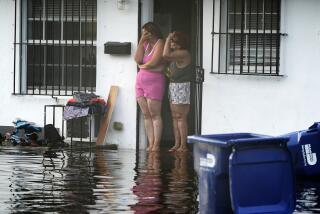Huddled in the Dark, Awaiting ‘Cosmic Comeuppance’
- Share via
MIAMI — As Hurricane Andrew approached Sunday, I sent the kids to stay with their mother and hunkered down in my house with the dog. I kept my hand on her most of the night, trying to stop her shaking. I wish she could have put a paw on my heart.
At first the wind merely rustled the palm fronds and sent the hedge of arelia into a spastic dance. But as the rain began to whip down the vacant street in sheets, I could hear the long branches of the live oak--usually a friendly shield from the sun--scratch menacingly at the clay tiles on the roof and Andrew’s hot breath grow into a roar. We were scared.
Twice the wind rattled the storm shutters on the sliding glass doors so loudly that it blared like a trumpet. Both dog and man started as if to a herald’s unexpected call.
Through the steady rumble of the wind, I caught the tinkle of the wind chimes that hang on a back corner of the house. I’d remembered to bring in the garbage cans, the potted plants, the wheelbarrow. I’d forgotten the wind chimes. But now, I was glad for that familiar sound.
At dawn the worst was over and we could peer out the windows and see the devastation--oak trees uprooted, limbs of black olives cracked and littering the streets, swimming pools a deep brown and layered with debris. By mid-morning people ventured out to walk the block and shake their heads.
In recent years Miami has been called many things--the magic city, the new Casablanca, even Paradise lost. As the city has struggled with refugees, riots and a gang-bang drug smuggling trade, many longtime residents have left, saying it was no longer safe.
But not for 27 years--more than a generation ago and well before the time of most South Florida residents--has Miami been threatened by the natural disaster to which this peninsula is more vulnerable than any other part of the United States. Being at ground zero for the landfall of a major hurricane, forecasters had warned, would be a preview of Armageddon, a nightmare visit by a house-caller from hell. But few believed it.
About 4 a.m. Monday, deep into a night as black as anyone here could remember, this city’s destiny arrived riding winds measured as high as 164 m.p.h. His name was Andrew.
Unable to sleep, I did the only thing possible: lit a candle and started to make notes. I recorded the thud of tree limbs as they hit the ground. There were changes in the escalating pitch of the wind and, toward dawn, the cry of a blue jay, its world blown away.
For those of us who have lived in South Florida only long enough to get careless or grow complacent about the hurricane season, Andrew was a rude awakening. Florida Gov. Lawton Chiles came on the radio late Sunday to say that Andrew looked like the worst storm to hit the East Coast of the United States since 1935. Few believed that either.
Meteorologists say that a hurricane is nature’s way of releasing heat, of venting some powerful energy. But to many of us who huddled in the dark listening to the cement block walls of our houses tremble and lift from their foundations, Andrew felt more like a cosmic comeuppance, an encounter of biblical proportion, as if God could be seen in Andrew’s clear, unblinking eye.
Unlike tornadoes and earthquakes, hurricanes can be predicted. With satellites, fiber optics and computers, we see them coming from miles away and they come in right on schedule. We know they are relentless and we know precisely how strong they’ll be and what kind of damage they can do. But we rarely believe it.
On television during the day Sunday it was clear that Miami was the target all along. Thousands of people evacuated their homes and fled inland but thousands more did not. I saw one man in Miami Beach look into a television camera, rheumy-eyed, and say:
“Hell, I can ride this out. I’ve been through hurricanes before.”
I made a note to pray for him and for me.
Monday, we had no electrical power, streets were impassable and we faced weeks of rehabilitation and cleanup.
And as we neighbors stood in the midst of the rubble, asking about each other’s well-being, comparing damage and estimates of repair, someone reminded us that Andrew was the first named tropical storm of the 1992 season. If this year is typical there will be nine more to follow. That scares me, too.
More to Read
Sign up for Essential California
The most important California stories and recommendations in your inbox every morning.
You may occasionally receive promotional content from the Los Angeles Times.













